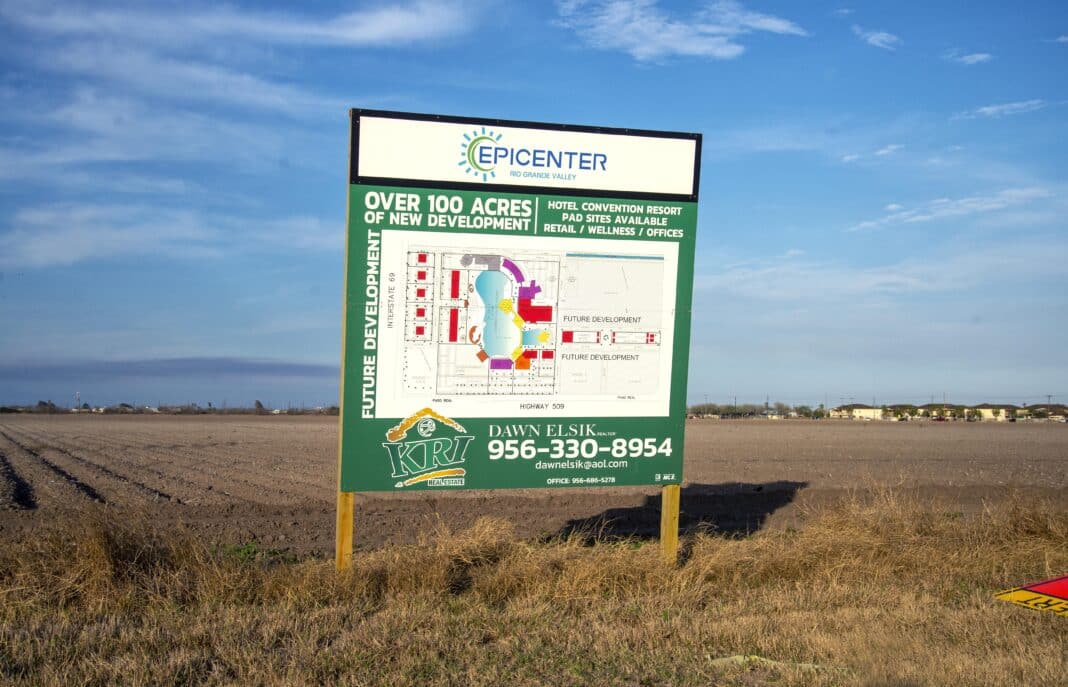SAN BENITO — The city will continue negotiating tax breaks with a developer proposing to build a $450 million convention center and hotel creating as many as 2,000 jobs.
Earlier this week, city commissioners met in closed session before voting to request City Attorney Mark Sossi continue negotiating incentives with Western Spherical Developers, a Friendswood company for which officials have rezoned 115 acres near Interstate 69 and FM 509 to make way for what would become the city’s biggest project in decades.
“We’re trying to see if we can give tax breaks,” Mayor Rick Guerra said Wednesday. “They’re still talking with the attorney and (City Manager Manuel De La Rosa). They’re still negotiating in order to be fair with the city and developer.”
Guerra said Sossi and De La Rosa are working with the developer to determine the cost of the project’s proposed buildings.
“They’re negotiating what the true costs are — what is the actual cost of the buildings going to be,” Guerra said.
As part of a contract, city officials have proposed incentives including tax breaks along with building and permit fee rebates hinging on the developer meeting the conditions of a performance agreement.
“Nothing has been set in stone,” Guerra said. “We haven’t given them anything yet.”
City’s obligation
After about three years of talks, officials and the developer entered into the development agreement last year.
“The city and developer agree that it is the developer who is solely at risk in the financing, construction and development of the RGV Epicenter and that it is up to (the) developer to successfully complete RGV Epicenter phase one on ‘the project site’ under the terms and conditions of this agreement in order to qualify for the economic incentive program,” the agreement states.
As part of the first of three phases, the developer would build a 23,000 square-foot convention center, a 142-room hotel and a five-acre lagoon during a three-year construction period.
“The city’s sole obligation to reimburse (the) developer … is limited to those new taxes and rebates generated by phase one on the project site itself,” the agreement states. “Developer acknowledges that developer is at risk in the event that RGV Epicenter phase one fails to generate sufficient abatements and rebatements to fully reimburse developer for developer’s maximum reimbursable expenses.”
The developer’s maximum reimbursable expenses include the $22.5 million construction of a convention center, roadways, utility lines, an elevated causeway, plazas and pavilion along with a $74.6 million project aimed at building a national flag hotel, food hall, lagoon and amusements.
Epicenter ‘village’
What would become the city’s biggest project in decades would create 1,013 jobs along with an additional 1,077 jobs during the three-year construction period, developers said.
In February, developer David C. Miles told commissioners the so-called “RGV Epicenter” project would generate $100 million in retail sales, hotel and property tax revenue for the city during a 20-year period.
During the meeting, Miles proposed the development of a sprawling “village” featuring two hotels, an entertainment center, a sports complex, restaurants and retail shops along with a five-acre “Crystal Lagoon.”
Miles said he planned to develop the project in three phases.
During a three-year construction period, the $180 million first phase would develop the convention center and a five-story, 142-room select-service hotel along with features including an entertainment center, performance hall, restaurants, retail shops and office suites and the five-acre lagoon.
Prospective tenants include Waypoint 2 Space, a Houston-based company training for commercial space flight, Miles said.
The project’s second and third phases, each funded through $120 million investments, would feature a sports arena and a “medical village,” he said.
Hotel occupancy tax funding
About three years ago, Tammy Huerta, daughter of the late Grammy-award winning singer Freddy Fender, helped spark talks between the developer and De La Rosa, Miles said.
Two House bills would help the developer fund costs through hotel occupancy tax revenue.
In 2019, state Sen. Eddie Lucio Jr. and state Rep. Eddie Lucio III helped push House Bills 4347 and 2199, which allow cities to spend hotel occupancy tax revenue generated through developments to fund construction of convention centers and sports and entertainment projects.
The developers are planning to launch construction in May or June, Miles said.




